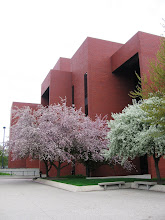Google Book Search Project: Its Promise for Ball State University's Students, Faculty for Research, Learning
Libraries without walls has become a catchphrase, the digital dream of making information available to anyone, anywhere, anytime. The Google Book Search Project (GBSP), a massive book digitization project begun in 2004, is taking us strides closer to that reality, http://books.google.com.
As part of Google’s newest partnership with Princeton University Library, Google plans to scan and make available one million titles over the next six years. Google has already established book digitization agreements with leading civic and national libraries like the New York Public Library and the National Library of Catalonia and academic libraries, including Harvard, Oxford, Stanford, University of Michigan, University of California, University of Wisconsin-Madison, University of Virginia, University of Texas at Austin, and Universidad Complutense de Madrid. Google has also announced that it will partner with Germany’s Bayerische Staatsbibliothek (Bavarian State Library).
Initially, Google adopted an aggressive, hotly contested, plan to digitize books indiscriminate of copyright. Google’s problematic proposal to digitize any book unless formally forbidden by contact from authors, publishers, or other copyright holders mired early digitization progress. However, the library partnerships quickly refocused digitization efforts on public domain titles, books published before 1924 that are no longer protected by copyright law.
To date, GBSP provides access to 524,600 full text, public domain books, fully searchable and available 24/7/365 to Ball State University students and faculty. This translates into unprecedented research access to both popular and rare titles from the period of 1521 - 1924. Whether looking for a 17th Century discourse on witchcraft, a cookery book from 1810, or a New York Times bestseller from 1900, Google Book Search Project is the place to go!
Locating a book is simple, and Google offers advanced search fields including author, title, ISBN, publication year, and publisher. For example, if you are only interested in antebellum writings on American slavery, you can enter your search terms and add a publication range of 1840 to 1860. Select “Full View” to limit searching only to public domain books, where full-text viewing is available to the user. Additionally, Google provides powerful right-hand navigation of a retrieved book and links the user to the book’s title page, table of contents, and index. A search box for full-text searching within the retrieved book allows a user to locate relevant parts of a text without browsing through page after page of the book. This functionality empowers Ball State students and faculty to conduct streamlined and precise textual research.
Another important long-term benefit of GBSP is the creation of digital surrogates for the increasing number of brittle books that are too fragile to circulate and are often stored for preservation with very limited physical access. GBSP is at once offering unprecedented access to aged texts and democratizing research, eliminating the need for rare book interlibrary loan borrowing fees or expensive travel to research repositories. Additionally, fragile books are protected from overuse and excessive handling.
As Ball State’s University Libraries continue to leverage the power of technology to organize and present access to dynamic learning and teaching resources, we recognize the value of directing our users to the GBSP as a growing and unequaled online research resource for pre-1924 texts.
To make this searching easier for students and faculty, the University Libraries provide ubiquitous linking from our site to this invaluable resource. Links are available through the Digital Commons on both the e-Books page and under each subject in the World Wide Web Resources page. The Google Book Search Project is an important asset to the University Libraries’ digital initiatives and enhances the rich print and digital collections already made available by the University Libraries for teaching, learning, and research.
For more information, contact Matthew C. Shaw, Ball State University Libraries’ Electronic Resources Librarian, MCShaw2@bsu.edu, (765) 285-1302.
This newsletter article first appeared in The Library Insider 5(3): 7; March 2007.
Labels: Ball State University Libraries, books, digital collections, Google Book Search Project, library at desktop, online resource, pre-1924


0 Comments:
Post a Comment
<< Home